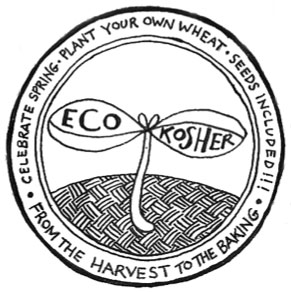At Naga Bakehouse our intent is to offer as much transparency into the baking process as possible so that everyone can decide if Vermatzah is right for their seder.
– We kasher – (make kosher our oven ) – by cleaning out the oven before baking a batch of Vermatzah to ensure that there is no leavening in the matzah.
– We only bake matzah in our wood fired oven during the months we produce Vermatzah.
– We do not bake our other breads until after Passover.
– Vermatzah is not baked under rabbinical supervision.
Vermatzah is the perfect choice for people who identify with Jewish history and culture, who prize their Jewish roots and want to participate in the holidays, but who do not subscribe to Orthodox principles.
Vermatzah believes in a concept known as “Eco-Kosher” – a new and evolving concept combining common sense and compassion with a range of ancient Jewish teachings. Eco–Kosher connects modern ecology with ancient dietary laws and ethical standards about food production, preparation and eating. At Naga Bakehouse we understand Eco-Kosher to mean a broader sense of “good practice” in everyday life that draws on the deep well-springs of Jewish wisdom and tradition about the relationships between human beings and the earth. Every box of Vermatzah is handmade with organic Vermont Wheat grown under the best sustainable agricultural practices from the harvest to the baking.
The concept of Eco-Kosher food entered Jewish thought in the 1970’s. In a recent blog post for the Shalom Center, Rabbi Arthur Waskow discusses how this concept applies to food prepared using modern technologies, and how by “eco-kosher” we mean a broader sense of “good practice” in everyday life.
Vermatzah: Sustenance For The Body; Fuel For The Soul